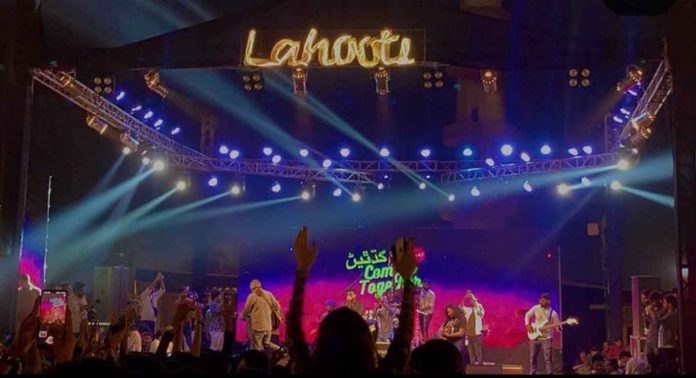Saif Samejo, lead singer of the band Sketches, and his wife, Sana Khoja, established the Lahooti Melo ten years ago. It all began on the rooftop of one of their homes in Jamshoro, with the intention of spending the weekend listening to and recording live music for later online publication. A decade later, the festival has expanded into a world-class cultural event that no longer features only local artists and activists.
The atmosphere has been “surreal,” Sana told over the phone, recalling when the festival’s attendance grew from 20 people to 20,000 people. All those ideas we had while jamming have now come to fruition. Let’s raise a glass to more years of spontaneity!
Ten-year anniversary
The 10th installment, taking place on May 6 and 7 at Hyderabad Club, will feature a diverse array of musicians and is poised to be unforgettable. Everyone can find what they’re looking for. We have a plethora of local artists like Umair Jaswal, Mai Dhai, Bhagat Bhoora Lal, Bakshi Brothers, Fakir Jumman, The Sketches, Panjhi Gang, and more, as well as international names like Buddhist musicians. And social activist Ani Choying Drolma from Nepal, French DJ, and model Sabrina Terrence, American musician Monica Dogra, and many more.
Saif Samejo clarified that the public and their staff take budget constraints into account when deciding which performers to book. This time around, I decided to put an emphasis on musical variety by conducting a poll. To find out the preferred genres of music among our audience members. Curiously, young people preferred electronic music, leading to an abundance of DJs.
This year’s Lahooti Melo theme is a mash-up of all the themes that the festival has promoted over the past decade. This year, we are not providing specifics. “We’ve called in all the experts from our previous editions, and we’re looking at music, art, education, poetry, and indigenous cultures. The river, and climate change from the perspectives of journalists, scientists, filmmakers, poets, musicians, law enforcement, and other relevant authorities,” said Saif.
Chaotic logistics
Saif Samejo and Sana have often considered calling it quits on Lahooti due to the numerous difficulties. It presents, such as arranging the artists’ travel and lodging. The dearth of lodging options beyond a two-star hotel in Jamshoro and Hyderabad. And the government’s attempts to stymie the festival at every turn.
Festivals require a skilled organizer. We’re just musicians,” Saif remarked, adding that securing public venues had been difficult.
No one at Sindh or Mehran University will give us permission to put on a show. Why? Security officials should be responsible for dealing with any public unrest that may result from such festivals. He said, despite claims to the contrary from the administration.
“Our decision-makers don’t really care to make special arrangements for international artists. So they don’t end up getting the exposure they deserve.”
Insights gained
One of my life’s lessons was the need to not make snap judgments about other people. Throughout this process, some well-known actors have shown their true colors and done the unexpected. While some government officials who seem unconcerned have actually been helpful. I’ve learned to trust the right people,” Saif replied, a note of sadness in his voice.
Saif believes that it is only because of his privilege that he was able to organize a successful entertainment event in this country.
The power of manifestation was another key concept they uncovered. “You’re not allowed to talk about taboo topics like assault, gender inequality, etc., or environmental catastrophes. Caused by climate change—especially in schools in Jamshoro and Hyderabad. We spoke about how music and poetry can help channel those thoughts,” Sana said, adding that she still gets goosebumps thinking about the day they were able to successfully introduce music as a subject in schools.
Sana went on to say that they knew it was only a matter of time before people understood. That Lahooti Melo is and should be more than just a music festival. Over time, I was astounded to learn that our event was the starting point for so many people’s adventures. We realized the power of music, art, and an artistic community after the United Nations launched a campaign on the Sindhu River. She said, “We may sit with scientists, policymakers, educators, instructors, poets, etc.
It’s not just our festival, either. “Any festival with a thinking team and sensitive artists who care about the cause and are passionate about social change can lead to such awareness and impact,” Saif continued.
Coke Studio’s Encounter with Lahooti
The “beautiful and rewarding” part of running Lahooti Melo, according to the couple. Was seeing the artists they helped launch go on to perform on more established stages and receive the accolades they deserved.
When Rohail Hyatt was in charge, our Jamshoro studio hosted tryouts for every indigenous artist in Pakistan. That was the last thing we expected to happen. Saif stated, “It makes me happy to see artists like Mai Dhai and Faqeer Zulfiqar achieve international success.”
That revitalized the region’s female musicians and singers. One time, before Mai Dhai appeared on Coke Studio, Sharmeen [Obaid-Chinoy] interviewed her. And inquired whether or not there were any other female singers like her. In Marwari, Mai referred to herself as one of many. The males, their culture, the media, and the government all play a role in keeping them in the background.
Saif elaborated by saying that it took Mai 60 years to realize her dream of becoming a famous singer. But hopefully, with the help of Lahooti and other such platforms, young folk musicians today won’t have to wait as long to find success doing what they love.
